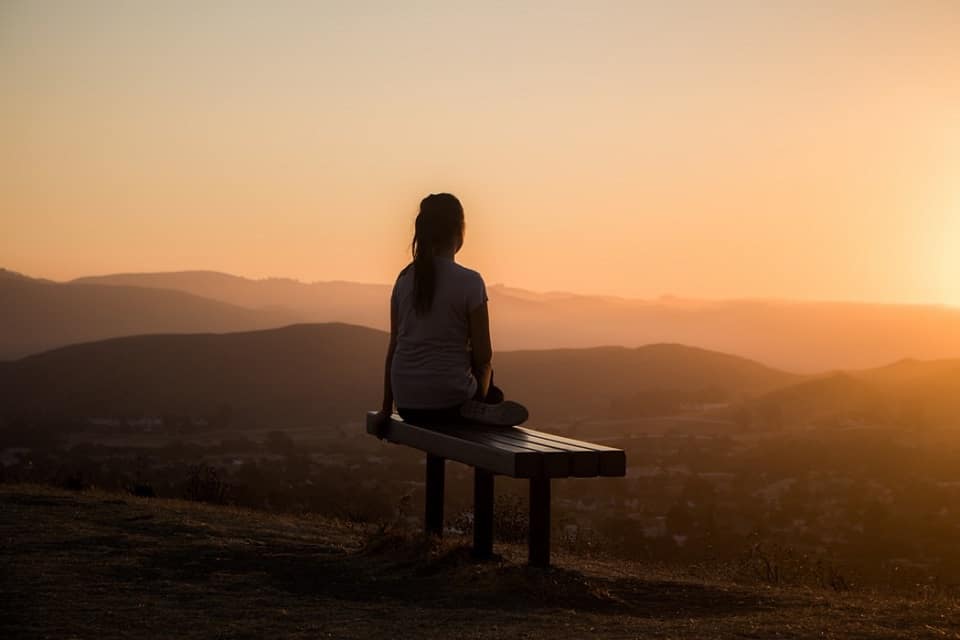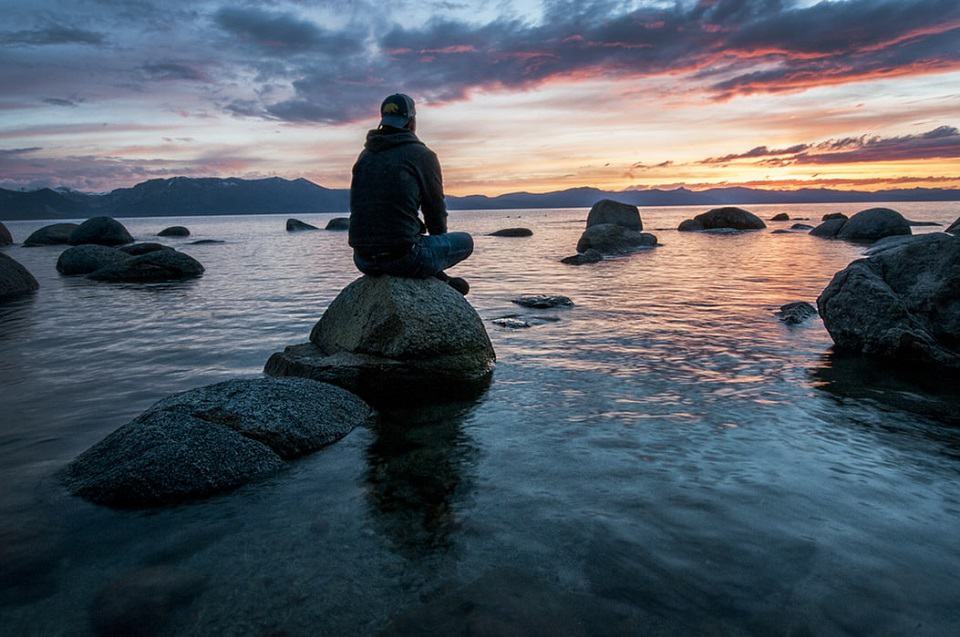We talk about meditation as a tool a lot here on NomadTalk and that’s not because we’re a pair of hippies, hell-bent on selling peace and love to the world. It is, in fact, because it has a ton of scientifically proven benefits and because it’s free to do and easy to learn.
Anyone can learn how to meditate as a digital nomad. You need no special equipment. Contrary to popular belief you don’t even need a quiet space to get away from the world in. All you need is you and a willingness to give it a go.

Table of Contents
The 2 Biggest Mistakes I Made When It Came To Meditation
I’d read so many accounts praising meditation (or its modern counterpart “mindfulness” which is, traditionally, not quite the same thing but for now – let’s pretend they’re interchangeable) that I wanted to give it a go.
The trouble was that every time I tried sitting up (or laying down) with my eyes closed, in a quiet space and trying to let go of my thoughts, I had two results:
- It was impossible to hold back my thoughts – in fact, the process made me feel like I was going in insane. I wasn’t getting to a form of inner peace but instead, I was a noisy uncontrolled mess. My mind was like a bunch of rabid squirrels in a tiny box being hit with a stick; it wasn’t going to be peaceful for more than a few seconds.
- Alternatively, I found myself fast asleep. This is, indeed, a state of peace and tranquility but it’s not entirely what I was aiming for and it certainly had no more benefits than being fast asleep.
So, it became clear to me that either meditating didn’t work (entirely possible – for years the World Health Organization has been pushing acupuncture, which is pure scientific bunk and demonstrably so, health and wellbeing advice is often total tosh even from “experts”) or that I was doing it wrong.
The 11 Science-Backed Benefits Of Meditation

But I persevered – the benefits of meditation (as advertised) are so good that I wanted some for myself.
Let’s take a quick look at those benefits (all of which have been supported by some sort of study or another – I haven’t gone through each study, however, to be certain of the efficacy of the trails they use):
- Stress reduction. I am not particularly stressed, at least not most of the time, but there’s definitely a background level of “too much stress” in me. An 8-week observation of a group involved in meditation showed a huge reduction in the chemical “cortisol” (a hormone produced when a person is under stress) in the blood. Other larger scale studies have shown the more stressed you are – the bigger the benefit of meditation.
- Reduced anxiety. This is my problem and has been my problem for as long as I can remember, I was diagnosed with clinical anxiety and though I no longer use drug therapy to deal with it – it’s always there, like a giant monster in the corner of my mind. It’s this benefit that has been my main attraction to meditation.
- General emotional health. I feel like this is a spurious benefit even though there are a ton of studies that support this finding. I don’t even know how you’d define “emotional health” let alone demonstrate this principle scientifically. However, the upshot of this seems to be people who meditate tend to be more optimistic than those who don’t.
- Greater levels of self-awareness. As this is the purpose of meditation – you’d hope that you’d get better levels of self-awareness. Studies, small ones mind you, have shown a link to greater levels of self-confidence and lower levels of loneliness among people who meditate.
- Better levels of attention span. I don’t have as many attention-span issues since I started to wean myself off social media. I can keep it together long enough to write books and to read them from start to finish too. But there are studies that report increased attention span as a benefit of meditation.
- Possibly wards of age-related memory problems – the studies conducted in this area are so small that I’d take this with a pinch of salt. But, it is possible that meditating may ward off memory loss in old age.
- Generates kindness. I am deeply suspicious of the word “kind” in modern society – a generation appears to have mistaken “the easiest way to not hurt someone’s feelings” for a genuine interest in seeing people do well. However, experienced meditators do focus on loving-kindness and it seems reasonable that people may become more compassionate for it. However, despite studies saying this is so – I’ve noted that people who tend to label themselves as “kind” tend to be among the weakest and most unpleasant people I’ve ever dealt with. Approach this with caution.
- It can help with breaking addictions. I quit problem gambling years ago, cold turkey and I’ve broken my 60-a-day cigarette habit by going cold turkey too. It was hell for a bit but it wasn’t the end of the world for me. If, however, you want to give something up and nothing has worked, it can hurt to throw some meditation in the mix. Small studies have shown success in breaking the dependency on alcohol and also on problem eating.
- Better sleep. I certainly find that going through traditional eyes-closed meditation can knock me out in seconds. The evidence says people who meditate can fall asleep quickly and sleep longer than most (this isn’t true for me – as I approach 50, I find myself leaping out of bed after 6-7 hours no matter what I do).
- It can help manage pain. Given that pain is a form of visceral stress via your nervous system, it follows that meditation can help you fend off pain. There are some large-scale studies that show it’s possible to better cope with chronic pain (even in end of life situations) when you meditate than when you don’t.
- It helps lower blood pressure. If it follows that stress increases blood pressure then meditating ought to lower your blood pressure by eliminating stress. Several decently-sized studies have shown this to be the case. In fact, 5 minutes of silent meditation were shown to drop your blood pressure by about 5 points, immediately.
How To Meditate As A Digital Nomad
I am happy to report that I may have been meditating wrong or it’s possible that my initial tutors weren’t clear enough about their explanation. I’ve read a lot (and listened to) a lot of material on meditating this last year or so.
My interest was switched on when about 18 months ago, I spent a month suffering from severe insomnia. It was so bad that I felt like I was going mad. Meditation came up again and again and again in nearly every source I examined and when I started reading about meditation – it seemed like I needed to learn it.
Gelong Thubten: My Inspiration
Fortunately, my insomnia cleared up even if my ability to meditate took much longer to arrive. In the end, the method I tried and found to work came from Gelong Thubten’s A Monk’s Guide To Happiness.
Gelong Thubten is a peculiar monk. He studied at Oxbridge, before moving to the US, losing his mind, spent years learning to meditate before going to teach meditation to corporates (a long time before the benefits of meditation were widely understood).
The Method For Meditation As A Digital Nomad

OK, I am going to share with you the simple meditation exercise recommended in the first exercise in A Monk’s Guide To Happiness.
- Sit on a chair with your back straight. (If you can’t sit, you can lay down but it’s recommended you sit – so that you stay awake, falling asleep is not part of this exercise).
- Keep your eyes open but don’t focus on anything in particular. (Closing your eyes, Thubten says, makes you dependent on meditating in a dark place – when the best benefits come from being able to meditate at will at any time you want to).
- Now, concentrate on your feet and focus your attention on the interaction between the soles of your feet and the floor (or the bed if you’re laying down).
- Examine the sensations in your toes, what do they feel like? Don’t make judgments of “good or bad” during this, what does it feel like? Your objective here is to recognize the actual feelings and not to pass comment on them.
- Then slowly work your way up your feet, how do the tops of your feet feel? Then on to your ankles and very slowly work your way up your body, at every point observing how you feel at that part of you.
- If you lose concentration, don’t be irked or feel like you’ve failed, but as soon as you recognize that you’ve lost concentration – bring your attention back to where you lost attention and keep going.
- Continue until you reach your scalp and hair.
- The whole process should take 5-10 minutes.
There you go. No spiritual mumbo jumbo. No falling asleep. Just a very simple method for focusing your thoughts. You can carry this out anywhere too from a hotel room to an airport to a coffee shop. You don’t need peace and quiet to get it done. No yoga mats. No silly lotus positions. Just a 10-minute space where you focus on yourself.
To get the most from this exercise, you need to do it regularly, a good time to get the first round done in a day is just after you wake up (which also reduces the chances of falling asleep) and then again after lunch.
There are more advanced techniques for meditation which you can introduce into your practice as you get better at it but to begin with – this will bring many of the benefits of meditation without any real challenges.
Conclusion
There are good reasons to learn to meditate. While we’re not completely convinced by the science on every benefit that it’s supposed to have – we’re convinced enough that it’s worth giving meditation a try.
There are many different methods of learning to meditate but I offer the only one which has helped me learn and which can be done anywhere; no closed eyes, no silly poses, no special music, no mantras, etc. This ought to fit perfectly into the digital nomad’s life too.
